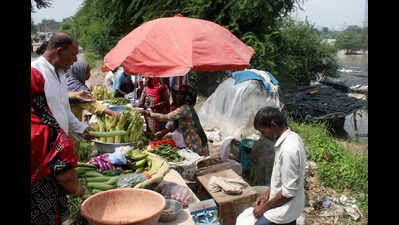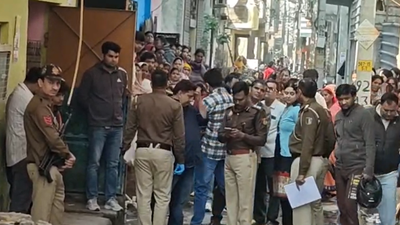New Delhi: Four days after most flood-affected families were shifted to designated relief camps, life is going on after a fashion. With little certainty about the future, people are finding ways to earn a livelihood, bartering basics and pooling resources to keep their families afloat.While not full-fledged marketplaces, a parallel economy has quietly taken root in the camps. At Khel Gaon, Arun,19, stands guard over the few potted plants he managed to rescue from his flooded nursery in Khadda Colony. With his sister Nidhi,13, and brother Luvkush,15, Arun lines up the pots outside their tent, selling a few every day to make ends meet. “In the week we’ve been here, we have sold over 20 plants. It’s not much but something to keep the family going,” the teenager said.A few tents away, Ratanlal Khevat is selling shampoo sachets to a neighbour. Once a hawker along the riverbank, he now relies on salvaged items to keep going. “I went with my cart door to door selling daily items. After shifting to the tent, I started selling necessities to the people here. They’re just basics, but the camp dwellers at least don’t have to go to Pandavnagar to buy, say, a packet of biscuit,” he said, grateful that the little he saved is proving useful now.For the ragpicker community near Pradhan Garden, the flood has opened up sale opportunities. Items such as glasses, bottles and chairs are now in demand among displaced families who have lost most of their possessions. Sabir smiled to tell of mothers buying his collection of glass bottles to store milk for their children. Champa recalled how two of her collection of eight chairs were swept away by the waters but had managed to sell two others to families in tents, even if at reduced prices.Vegetable growers, among the worst hit having had their crops inundated, are also trying to do the best they can, selling damaged produce to fellow flood-affected families at half the usual price. At one camp, Tarawati, 26, displayed ladyfinger, tomato and corn that she was able to save from the floods. “These don’t give us the appropriate returns for our labours, but at least we have something,” she reasoned. Most days, she manages to save around Rs 100, which quickly goes into buying daily essentials.The adults are already resuming their jobs after a three-day hiatus, with the children left behind to stand guard at the tents. Many of them work as gardeners, domestic workers, perhaps sanitation workers in govt offices and cannot afford to lose even a day’s pay. The parallel economy inside the camps might be modest, but for now, it is helping families scrape by in the absence of financial stability.











